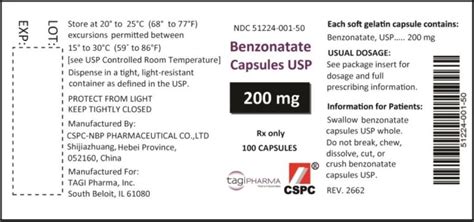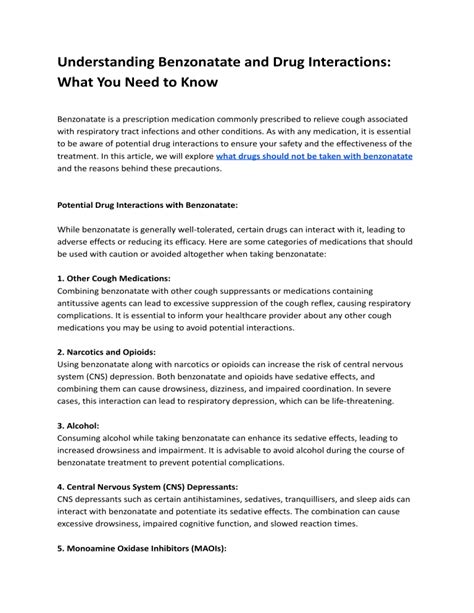Intro
Discover the potential risks of Benzonatate, a common cough medicine. Learn about the possible Benzonatate side effects, including allergic reactions, gastrointestinal issues, and interactions with other medications. Understand the symptoms, causes, and treatment options to ensure safe usage. Get informed about Benzonatates effects on your body.
Benzonatate is a medication commonly used to treat coughs caused by the common cold, flu, and other respiratory infections. It works by forming a protective barrier on the mucous membranes in the throat, which helps to reduce the cough reflex. While benzonatate can be effective in relieving cough symptoms, it can also cause some side effects. In this article, we will discuss the common side effects of benzonatate, as well as some rare but serious side effects that you should be aware of.

Common Side Effects of Benzonatate
The most common side effects of benzonatate are mild and temporary. They may include:
- Dizziness or lightheadedness
- Drowsiness
- Headache
- Nausea or vomiting
- Stomach upset or diarrhea
- Constipation
- Fatigue
These side effects are usually not serious and may go away on their own within a few days of taking the medication. However, if you experience any of these side effects and they are severe or persistent, you should talk to your doctor.
How Benzonatate Works
Benzonatate works by forming a protective barrier on the mucous membranes in the throat. This barrier helps to reduce the cough reflex by blocking the nerve endings that stimulate coughing. Benzonatate also helps to thin and loosen mucus, making it easier to cough up.

Rare but Serious Side Effects of Benzonatate
While rare, benzonatate can cause some serious side effects. These may include:
- Allergic reactions: Some people may be allergic to benzonatate and experience symptoms such as hives, itching, and difficulty breathing.
- Seizures: Benzonatate can cause seizures in some people, especially those with a history of seizure disorders.
- Psychosis: In rare cases, benzonatate can cause psychosis, a condition characterized by hallucinations, delusions, and disorganized thinking.
- Coma: Benzonatate can cause coma in rare cases, especially when taken in large doses.
If you experience any of these serious side effects, you should seek medical attention immediately.
Who Should Not Take Benzonatate
Benzonatate is not suitable for everyone. You should not take benzonatate if:
- You are allergic to benzonatate or any other ingredients in the medication.
- You have a history of seizures or epilepsy.
- You have a history of psychosis or other mental health conditions.
- You have a condition that affects your breathing, such as chronic obstructive pulmonary disease (COPD).
- You are taking certain medications, such as sedatives or tranquilizers.

Precautions When Taking Benzonatate
To minimize the risk of side effects, you should take benzonatate with caution. Here are some precautions to follow:
- Take benzonatate exactly as directed by your doctor.
- Do not take more than the recommended dose.
- Do not take benzonatate with other medications that can cause drowsiness or dizziness.
- Avoid driving or operating heavy machinery while taking benzonatate.
- Do not drink alcohol while taking benzonatate.
Interactions with Other Medications
Benzonatate can interact with other medications, including:
- Sedatives and tranquilizers
- Antihistamines
- Muscle relaxants
- Opioid pain medications
These interactions can increase the risk of side effects, such as drowsiness and dizziness. You should talk to your doctor before taking benzonatate with any other medications.

Conclusion
Benzonatate is a medication that can be effective in relieving cough symptoms. However, it can also cause some side effects, ranging from mild to serious. To minimize the risk of side effects, you should take benzonatate with caution and follow the precautions outlined above. If you experience any serious side effects, you should seek medical attention immediately.
FAQs
What is benzonatate used for?
+Benzonatate is used to treat coughs caused by the common cold, flu, and other respiratory infections.
What are the common side effects of benzonatate?
+The common side effects of benzonatate include dizziness, drowsiness, headache, nausea, and stomach upset.
Can benzonatate cause serious side effects?
+Yes, benzonatate can cause serious side effects, including allergic reactions, seizures, psychosis, and coma.
We hope this article has provided you with a comprehensive understanding of benzonatate side effects. If you have any further questions or concerns, please don't hesitate to ask.
